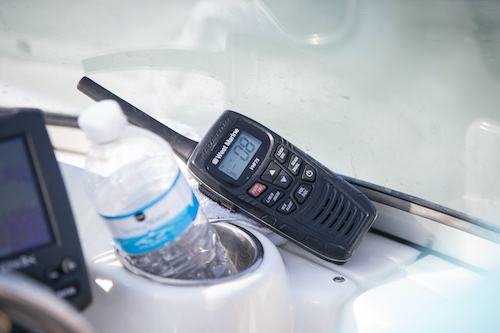Marine VHF radio is a worldwide communication system used by ships, watercraft, and airplanes. It's a two-way communication method that sends messages via VHF (very high frequency) radio waves.
Generally, professional boaters, aviators, and land monitors use these frequencies for safety and transparency reasons. And when you start boating and receive access to these channels and devices, it's crucial that you act with respect and follow the best practices.
Let's review some common mistakes to avoid while using VFH radio frequencies.
Avoid These 10 VHF Radio Mistakes:
1. Not Listening to Who's Speaking Before Talking
Out of all the marine VFH radio standard practices, this is the one to keep top of mind. VFH channels follow a certain etiquette, and you'll want to be mindful of what you say and do.
When you join a channel, take some time to pause and listen to any ongoing conversation before you chime in. Avoid cutting people off or speaking over them, and wait for a gap in conversation before speaking.
2. Failing to Identify Yourself
There's a reason your boat has a name! And when you start talking, make sure to introduce yourself with your ship's name or callsign. A boat's call sign is a special combination of letters and numbers used to locate and communicate with it via radio. Regulatory groups assign vessels call signs to make radio conversations easier.
3. Taking Too Long to Speak
Keep your messages short and sweet when talking on VHF radio while on your boat. Ensure conversations are concise and avoid off-topic or lengthy discussions.
If you're trying to communicate with a buddy, set up another channel to speak on. Just make sure it's not for emergencies or distress calls.
Keep in mind that all boats use the same few channels, so your messages should remain brief (under three minutes) and reserved for important purposes. You can use your buddy's boat name and call sign to reach them. If you don't know their boat name, avoid mentioning their personal name. Instead, call them on their cell phone.
Keep channel 16 open for emergencies. And know that if you misuse the channels, the Coast Guard will likely tell you to stop.
Read Next: U.S. Coast Guard Requirements
4. Utilizing The Wrong Channel
As mentioned, the national emergency, safety, and calling frequency is channel 16. Therefore, ships should tune into this channel for essential safety updates and emergency assistance.
Channel 16 is monitored by commercial radio operators for U.S. Coast Guard dangers, navaid updates (navigational aid), weather warnings, and boat messages.
And you've probably already put this together, but channel 16 should never be used for conversations that aren't about safety or emergencies.
5. Holding Down Transmit Button When Not Speaking
It's not uncommon for people to accidentally hold the transmit button down after they've finished speaking. However, this sends a terrible noise across the air channels. To keep your radio safe from damage — and to protect other boaters' ears — make sure you're only pressing the transmit button when you're speaking.
6. Not Saying "Over" When You're Done Talking
Saying "over" at the end of your speech lets others know you're finished speaking and awaiting a response. Communication is vital when using VFH radio for boats, and if you don't necessarily require a response, you can say "out" or "clear."
If you need to contact another boat:
- Say its name three times and mention your boat once.
- If you don't receive a response, wait two minutes before trying again.
- Refrain from calling the same ship more than three times, and you should wait at least 15 minutes after the third failed attempt to reach the person.
7. Letting Unexperienced Kids Use Radio
If your child understands marine radio protocols and takes them seriously, they shouldn't have a problem using the radio. However, it's not a toy, and little kids shouldn't treat them as such.
Read Next: Safe Boating With Kids
8. Using Profanity or Making Fake Emergency Calls
Kids are often on boats, too! Therefore, you should avoid using foul language. Additionally, making non-serious distress emergency calls is illegal.
9. Not Completing Radio Equipment Checks
Boaters should regularly check their radios to ensure they're working correctly. Radios get worn out from constant use and exposure to harsh conditions. Therefore, checking the transceiver, microphone, speaker, and power supply for any issues before heading out on the water is essential.
10. Using "Radio Lingo" From Movies
Movies and TV shows often exaggerate radio conversations. Therefore, repeating language and phrases you've only heard once is unwise. Make sure you learn the correct boating communication lingo before you go!
The Bottom Line
As long as you stick to marine VHF radio best practices — and avoid the mistakes mentioned in this post — you should be all set to use your marine radio with ease. But if you have further questions, don't hesitate to explore the additional resources on our Discover Boating website.


